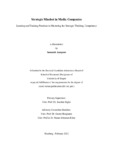Citation link:
http://dx.doi.org/10.25819/ubsi/10079| DC Field | Value | Language |
|---|---|---|
| dc.contributor.author | Azarpour, Samaneh | - |
| dc.date.accessioned | 2022-02-24T14:25:10Z | - |
| dc.date.available | 2022-02-24T14:25:10Z | - |
| dc.date.issued | 2022 | de |
| dc.description.abstract | The unstable and highly dynamic media market forces media managers to respond to crises rapidly, which increases the risk of making decisions without ascertaining the optimal strategic solutions. An uncertain environment pressures decision-makers to mostly rely on their own preferences based on accessible information. Under such circumstances, they tend to simplify the situation and reduce the number of alternatives, which results in neglecting an important part of the available information. Therefore, the decision-making process might lead to satisficing decisions rather than optimizing ones. Studying the media management literature shows, till present, there have not been any explicating studies on how media managers can simultaneously process information systematically and strategize quickly to develop an optimal strategic solution. Besides, Picard in 2004 mentioned that media organizations are competing in an environment that is full of strategic challenges, and it is required to develop new strategies more than any industry. According to previous studies, researchers claim that strategic thinking as a cognitive process is the most critical leadership skill in an organization which can equip managers to have a clear mental model to understand the complexity of the markets. This enables the managers to respond to strategic problems efficiently and to make thoughtful decisions by confronting the increasing intricacy and complexity of the media industry. We believe that the development of strategic thinking abilities of media managers is an inimitable resource, which could build a sustainable competitive advantage for media organizations. Therefore, this research aims to find the techniques which can be applied in the process of training media managers in order to improve their ability of strategic thinking. | en |
| dc.identifier.doi | http://dx.doi.org/10.25819/ubsi/10079 | - |
| dc.identifier.uri | https://dspace.ub.uni-siegen.de/handle/ubsi/2165 | - |
| dc.identifier.urn | urn:nbn:de:hbz:467-21655 | - |
| dc.language.iso | en | de |
| dc.subject.ddc | 330 Wirtschaft | de |
| dc.subject.other | Strategic thinking competency | en |
| dc.subject.other | Strategic mindset | en |
| dc.subject.other | Learning and training practices | en |
| dc.subject.other | Media companies | en |
| dc.subject.other | Media manager | en |
| dc.subject.other | Kompetenz des strategischen Denkens | de |
| dc.subject.other | Strategische Denkweise | de |
| dc.subject.other | Lern- und Ausbildungspraktiken | de |
| dc.subject.other | Medienunternehmen | de |
| dc.subject.other | Medienmanager | de |
| dc.subject.swb | Medienwirtschaft | de |
| dc.subject.swb | Lerntechnik | de |
| dc.title | Strategic mindset in media companies | en |
| dc.title.alternative | Strategisches Denken in Medienunternehmen | de |
| dc.type | Doctoral Thesis | de |
| item.fulltext | With Fulltext | - |
| ubsi.contributor.referee | Eigler, Joachim | - |
| ubsi.date.accepted | 2022-01-25 | - |
| ubsi.organisation.granting | Universität Siegen | - |
| ubsi.origin.dspace5 | 1 | - |
| ubsi.publication.affiliation | Fakultät III - Wirtschaftswissenschaften, Wirtschaftsinformatik und Wirtschaftsrecht | de |
| ubsi.subject.ghbs | QAF | de |
| ubsi.title.alternative | Learning and training practices in mastering the strategic thinking competency | en |
| Appears in Collections: | Hochschulschriften | |
Files in This Item:
| File | Description | Size | Format | |
|---|---|---|---|---|
| Dissertation_Samaneh_Azarpour.pdf | 4.46 MB | Adobe PDF |  View/Open |
This item is protected by original copyright |
Page view(s)
851
checked on Nov 25, 2024
Download(s)
1,810
checked on Nov 25, 2024
Google ScholarTM
Check
Altmetric
Items in DSpace are protected by copyright, with all rights reserved, unless otherwise indicated.

